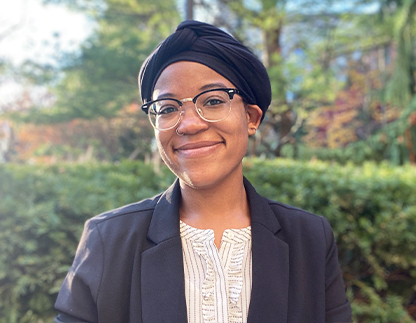My biggest piece of advice to others starting their professional careers is to remember that you're not on anyone's time but your own.”
Mikala Stokes (she/her)
PhD Candidate in the Department of History

Mikala Stokes is a PhD candidate in the Department of History. Her research and teaching interests focus on race, gender, and politics in pre-Civil War America. Her dissertation entitled, "Born of ‘Hardship, Trial, and Suffering:’ Black Men, Family, and Activism, 1830-1861,” explores the political activism and lived experiences of free African Americans in the thirty years before the American Civil War. She is particularly interested in the connection between Black people’s personal lives and nineteenth-century Black freedom struggles.
How would you describe your research and/or work to a non-academic audience?
My research focuses on the political activism and lived experiences of free African Americans in the thirty years before the American Civil War and the abolition of U.S. chattel slavery. Despite the limited liberties that free Blacks enjoyed, slavery based on the condition of Blackness fundamentally imperiled the lives of free African Americans. My research asks how free Black men’s ideas about gender and family influenced their approaches to the fights against slavery, racial prejudice, and disenfranchisement. I argue that free Black men, many of whom were formerly enslaved, drew on their experiences of precarious fatherhood, marriage, and kinship to enshrine stable, prosperous Black families and patriarchal manhood as tools of liberation.
Free Black communities’ conceptions of idealized masculinity and domesticity in the cause of Black uplift led many individuals to politicize their bodies, relationships, and homes—a dynamic that has lingering consequences today. Such insights, I hope, will encourage people today to think critically about how they mobilize their intimate lives in global social justice movements and consider rest as a form of restorative justice for marginalized communities.
Tell us what inspired your research and/or work.
The first inspiration for my project was the life story of Henry Bibb, a formerly enslaved man, who became a prominent abolitionist before the U.S. Civil War. Bibb successfully fled slavery to Ohio, a free state, but returned to Kentucky, where he had been enslaved, to rescue his wife and daughter. Unfortunately, his rescue attempts failed. Bibb’s story was captivating to me because he risked the nominal freedom he found in Ohio for the chance to reunite with his wife and daughter. His actions underscored how African Americans prioritized their family in the battles against slavery and racial oppression.
What advice would you give your younger self or someone considering a similar path?
At every stage, prioritize intentional rest and personal fulfilment. My biggest piece of advice to others starting their professional careers is to remember that you're not on anyone's time but your own. Life has several artificial time clocks that can incentivize us to always be in a rush to the next milestone. For me, this led to periods of anxious rush and mindless labor. Now, I recognize that my graduate education is a marathon and not a sprint. The cycle of constant comparison seeds self-doubt and anxiety. Instead, I'm creating timelines for personal and professional progress that are meaningful to me.
Whom do you admire in your field and otherwise, and why?
I admire the faculty members in my department. I appreciate how these scholars go out of their way to make history accessible to general audiences in capacities that are not always rewarded by academia.
Why Northwestern?
While I was in college, I participated in an undergraduate summer research program at Northwestern called the Summer Research Opportunities Program (SROP). Serendipitously, my research mentors that summer were Drs. Leslie M. Harris and Kate Masur, my current advisor and dissertation committee member, respectively. I learned that Northwestern’s History Department was an extremely collegial academic environment where I would develop my research and writing skills to become an engaging historian.
How do you unwind after a long day?
I am a huge walker. During the warm months, I usually go to the beach every day and walk by the lake. Even in the winter months, I throw on my warmest coat and go walking at least a few times a week. It's a great stress reliever for me. In my free time, I also like to try new restaurants. Chicago has a great food scene, and restaurant hopping gives me a great excuse to visit Chicago's different neighborhoods. I have tried places in Pilsen, the West Loop, Hyde Park, Lincoln Park, Edgewater, Logan Square, and more. Most recently, I tried Roux in Hyde Park.
What are you most proud of in your career to date?
I am most proud of the op-ed I published in the Chicago Tribune that explored the fight for Black representation at the 1893 Chicago World’s Fair. I argued that Black journalists like Ida B. Wells' biggest tool for greater inclusion at the exposition was their mobilization of US history. For me, their activism provided an opportunity to encourage readers to see history as more than a school subject and as an instrument for social justice with real-world application. This was a moment where I could see my research and expertise making an impact among audiences outside of academia.
Published: January 24, 2023
If you know a graduate student, postdoctoral trainee, graduate faculty member, staff member, or a member of our TGS alumni population who would make a great candidate for our TGS Spotlight Series, please complete this brief TGS Spotlight Series Nomination Form.